I hadn’t been able to decide on which film to review after Benazir, so I asked a bunch of friends to help me out – just by suggesting a genre. I got a varied lot of answers. Romance. Comedy. Social drama, à la Ladri di Biciclette. Suspense. Something with Cary Grant.
The result? This film, which is suspense, has a good bit of romance and comedy – and stars Cary Grant. (Sorry, Harvey: I’ll review something along the lines of Ladri di Biciclette sometime soon).
Charade begins with a bang. A dead man is pushed (by whom, we do not see) off a train on the Paris-Bordeaux line. He tumbles off down the embankment, and the credits begin to roll.
The scene now shifts to a ski resort, where Regina ‘Reggie’ Lampert (Audrey Hepburn) is holidaying with her friend and ex-colleague Sylvie (Dominique Minot) and Sylvie’s little son, Jean-Louis (Thomas Chelimsky). Reggie confides in Sylvie that she’s divorcing her husband Charles. Charles Lampert may be very wealthy, but Reggie’s had enough of his lies.
At the resort, Reggie also happens to meet Peter Joshua (Cary Grant). They introduce themselves; Reggie learns that Mr Joshua is divorced; and that he, like Reggie, is heading back to Paris. She tries, in her unabashed way, to flirt with him, and finds that he doesn’t reciprocate. He’s not snooty or rude; just inclined to think of her as much too young.
Anyway, Reggie and Sylvie and Jean-Louis return to Paris, and Reggie goes up to the fine apartment she and Charles own.
– only to discover that it’s empty. Everything, from furniture to carpets to the contents of every single wardrobe and cupboard, has been removed. There’s not even any electricity.
She’s just running out when a policeman arrives. Inspector Edouard Grandpierre (Jacques Marin) has come looking for Madame Lampert, and having found her, takes her to the morgue, to identify Charles – the dead man who’d been thrown off that train.
In his own office, the inspector then tells Reggie where Charles had been found. He also informs her that the Lampert apartment is empty because, while she was holidaying, Charles had auctioned off all its contents, for a total of about $250,000.
That $250,000 seems to have vanished into the blue. Grandpierre’s questioning of Reggie draws a blank: she supposes Charles Lampert (who was Swiss) was very wealthy, but has no idea where he got his wealth, where he kept his money, whether he had any family or not, or where that $250,000 could possibly have gone.
Nothing was found on Charles’s pyjama-clad body, and the rather shabby bag that he’d left behind in his train compartment has nothing valuable either. The inspector exhibits the bag and its contents for Reggie’s benefit: a toothbrush, tooth powder, comb, four passports (all Charles’s, and all under different names – Reggie’s eyes widen), a ticket of passage to South America, and a letter (stamped but unsealed) for Reggie telling her that he had changed her dentist’s appointment.
“We took the liberty of calling your dentist. We thought that perhaps we would learn something.”
“Did you?”
“Yes. Your appointment has been changed.”
Hehe.
That evening, in her empty, echoing apartment, Reggie has a visitor – Peter Joshua – who offers to help her shift to a hotel. “Nothing too expensive,” she says, since now, with Charles Lampert’s wealth gone, she’ll have to go back to earning a living. She tells Peter that she used to work as a simultaneous interpreter, from French to English, at EURESCO. She’ll take up the job again.
The next scene is at Charles Lampert’s funeral. His body, tastefully laid out in a coffin and surrounded with flowers, lies in a room. The only occupants of the many chairs in front are Reggie, Sylvie, and Inspector Grandpierre. Just as Reggie and Sylvie are beginning to think that’s going to be the sum total of the attendees, a man (Ned Glass) enters, walks up to the body, and breaks into a violent fit of sneezing, before he sits down.
Then comes another (James Coburn), who strides arrogantly up to the coffin, reaches into his pocket, and draws out a small mirror, which he holds in front of the corpse’s nose. Satisfied that Charles Lampert really is dead, he replaces the mirror, goes to Reggie (he initially thinks Sylvie is Mrs Lampert), and says, “Charlie had no call to doin’ it thataway. No, sirree.”
How odd.
He sits down too, and next, with a banging open of the door, yet another man (George Kennedy) comes in, shoves a pin into the corpse’s hand, and when there’s no reaction, strides out again, banging the door behind him. What on earth is happening?
The last person to arrive is a deferential man who doesn’t go up to the corpse, but hands over a letter to Reggie. This is from a Mr Hamilton Bartholomew at the American Embassy, asking her to visit him at his office.
Mr Bartholomew (Walter Matthau)’s secretary seems to be out to lunch, but he welcomes Reggie into his office, and offers her sandwiches and wine. He also lets Reggie know that he works for the CIA (“Central Intelligence Agency,” he explains, when Reggie admits she has no idea what the CIA is). He is not an agent himself, but handles administration.
More importantly, he shows Reggie an old photo – from World War II, in 1944 – which surprises Reggie.
Because, in the photo, along with a young-looking Charles Lampert, are also the three men who came to see his corpse at the funeral. Bartholomew identifies them for Reggie: the sneezer is Leopold Gideon; the mirror-wielder is Tex Panthollow, and the man with the pin is Herman Scobie. ‘Charles Lampert’, Bartholomew tells Reggie, was actually ‘Charles Vaas’ – that was his real name.
What does all of this have to do with Reggie? Well, Charles Vaas had stolen $250,000 (American government money, which is why the Embassy has an interest in it), and these three men believe they have a right to that money. Now that Charles is dead, and the money is missing, Tex, Scobie and Gideon will believe that Reggie knows where the money is. She is in great danger.
Bartholomew gives her his phone number, and Reggie leaves. She is already quite fascinated by Peter Joshua, so meets up with him, and suggests they go out for dinner. She’s obviously decided Peter is a far better prospect than Charles ever was, and there’s no point mourning a husband she didn’t care for – and who may have left her in deep trouble, anyway.
Unfortunately, this trouble surfaces at dinner.
Reggie and Peter have been enjoying themselves, conversing (Reggie spends most of her time trying to flirt with a relatively reserved Peter), dining, and joining in a game on the dance floor… when Reggie finds herself being grabbed by Gideon, who threatens her. When, in a panic, she somehow breaks loose and rushes out to the phone booth to call Bartholomew, Tex enters the booth and threatens her too.
Reggie is a nervous wreck by now, and Peter, when he finds her, takes her back to her hotel. When she enters, whom should she find there, but Scobie (who, it now turns out, has a massive metal hook instead of a right hand)? Scobie threatens Reggie, and even attacks her. Reggie runs out, screaming for Peter, and he comes racing up to her rescue.
While Reggie stands in the corridor outside, Peter and Scobie fight it out, and Scobie finally escapes through the balcony. Peter follows him, jumping from one balcony to the adjacent one, until he finally arrives at the balcony of the room where the three men – Scobie, Tex, and Gideon – are holed up. Peter climbs in, and confronts the men.
“Did you get the money?” Gideon asks Peter.
“How could I, with the three Marx Brothers breathing down my neck?” Peter retorts. “I thought we had an agreement. Now the girl trusts me. If she’s got the money, I’ll find out about it, but just leave me alone.”
It also emerges that he’s no Peter Joshua at all, but someone named Carson Dyle.
No. Oh, no. Poor Reggie. The one man she trusts, the man she’s fallen in love with, is only playing a game. It’s lies all over again. And she’s now being pursued not by just three men who may kill to get that elusive money, but four men who may kill… what now?
Charade has been called the ‘best Hitchcock film Hitchcock didn’t direct’ (it was directed by Stanley Donen), and it’s a good description. This is a fast-paced suspense film, with lots of delicious twists and turns. Definitely worth a watch if you’re a fan of the genre.
What I liked about this film:
Plenty: the unflagging, twist-riddled pace of the screenplay; the dialogues (there are some delightfully comic lines here), and the cast. All of them are great actors, and Grant and Hepburn, in particular, are superb.
What I didn’t like:
A particular scene where Cary Grant takes a shower while fully clothed in a suit. The story goes that since Grant wasn’t in great physical shape by this time (he was 59, after all), he wouldn’t have looked great bare-chested, so the scene was changed to have him clothed all the while. Since the scene isn’t especially relevant (and is really rather silly), I’d have changed the story to cut it out completely.
Reggie. This woman, frankly, irritated me in some places. I’m not cribbing about Audrey Hepburn – her acting is spot-on – but Reggie herself gets on my nerves at times. On the one hand, she’s terrified that Tex, Scobie, and Gideon are baying for her blood. On the other hand, she recovers amazingly quickly from any incidents that would have been expected to daunt anyone. Recovers, and goes quickly back to chasing Peter Joshua/Carson Dyle/whoever he is. A little hard to believe.
And it does sound odd that Reggie knows absolutely nothing of what Charles did for a living, whether he had any family, etc. Granted, she didn’t love him anymore, but surely there must have been a time when she did, and when they talked? (Even if they hadn’t, giving the inspector those monosyllabic negative answers when he questions Reggie is a silly thing to do. He might have been less suspicious if she’d told him how things had been between her and Charles).
Anyway, I’d still recommend this film. Highly. Charade is a complete charade – and you can never tell who’s playing it. It is also an excellent, very entertaining suspense film and comedy, with a good dose of romance thrown in. A must-watch.
Little bit of trivia:
Hindi cinema seems to have been inspired – at least twice – by Charade. The theme music of Charade (composed by Henry Mancini) was adapted by Shankar-Jaikishan to create the title song of Gumnaam, and if you’ve seen Andaaz (1971), you’ll note that the game in the party setting for Dil use do jo jaan de de, is the same that Grant, Hepburn & Co. play in the scene where Reggie is assaulted by Gideon. It’s the game where an orange, tucked under a participant’s chin, must be passed on to another without the use of hands. I wonder whether that game was actually popular in India in the early 70s.




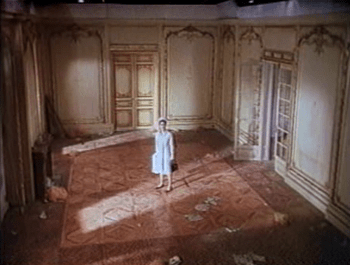
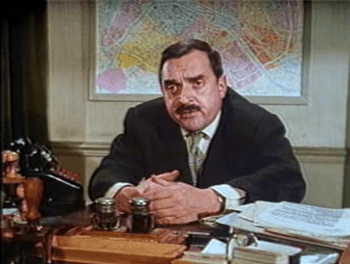
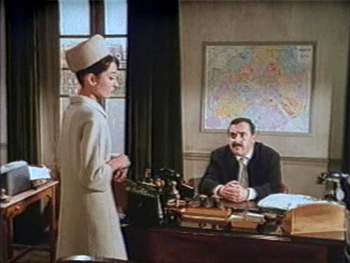
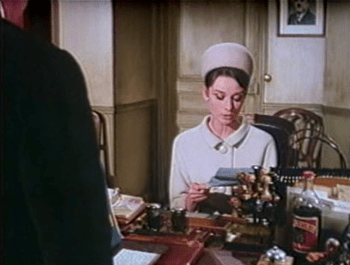

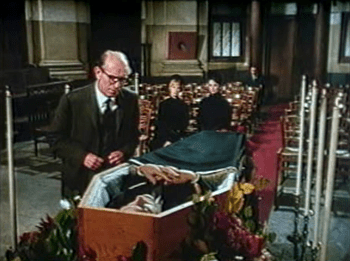


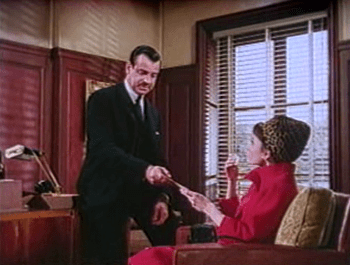
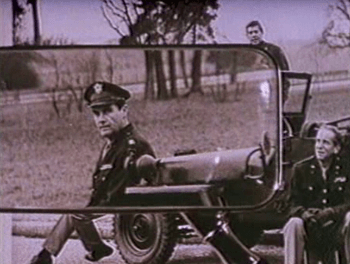




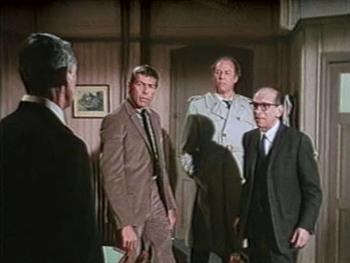
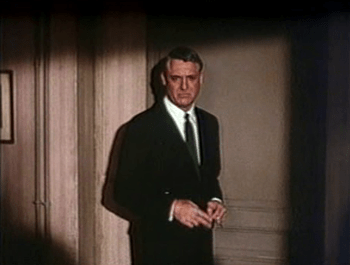

Why did I think that you have already reviewed Charade? Maybe we just discussed it on FB. Looking forward to reading the review!
LikeLike
Harvey, both Sharmi and I reviewed the film at the same time last year. :)
http://anuradhawarrier.blogspot.in/2011/11/charade.html
LikeLike
Yeah, how could I have forgotten that!
LikeLike
Yes, after reading both these reviews I was tempted to see this film – and I did – on the net ;-)
LikeLike
I can see in your comment below that you realised we’d been discussing Charade when I reviewed How to Steal a Million. I guess the combination of Audrey Hepburn, Paris, and leading men with assumed identities is what makes the films similar, in some ways. I, for one, prefer Charade to How to Steal a Million. :-)
LikeLike
Enjoyed reading the review. It freshened up my memory!
Now I want to watch it again.
This is the best screwball-thriller I have ever seen.
Now I remember having discussed with you the pro and cons of this film in relation to How to Steal a Million (1966).
“Sorry, Harvey: I’ll review something along the lines of Ladri di Biciclette sometime soon”
1. You don’t have to be sorry. As you see I am really VERY happy with your choice!
2. Looking forward to the review of a film on a social drama!
I think this is the classical case of having the cake and eating it too! :-)
LikeLike
Yes, Harvey – it’s a fantastic screwball thriller, isn’t it? The best I’ve seen, too.
And I’m so glad you liked this one! But I’ll watch a social drama soon, too. :-)
LikeLike
Thanks, Madhu, for the movie with Cary Grant and romance! And what a lovely review – makes me want to watch the movie all over again! I had watched part of it some time back, when Anu (I think) had reviewed it, so now it is time to watch it fully.
By the way, that game of passing the oranges was played in the late 50’s and 60’s!
I watched this movie in the 60’s, in the auditorium in college, one summer evening, and fell in love with the characters and have watched it several times since then and loved it each time. Cary Grant’s glasses, his cute chin, and a bunch of impressionable teenagers – are you surprised at the fascination? My college seemed to show us a lot of his movies – Charade, North by Northwest, Mother Goose, and then we went and watched Arabesque – that was another good one! Thanks again, Madhu!
LikeLike
Oh, Lalitha – you must watch it fully, it’s a delightful film, and the suspense angle is really very good. Plus Cary Grant is – as usual – just so perfect! I so envy you getting to see his movies in an auditorium – I’ve only ever managed to watch his films (or, come to think of it, any films from back then) on TV, or occasionally online. I’ve seen loads of his films, and except for I’m No Angel (which Mae West spoiled for me!), I’ve liked him in all. And now I must get hold of Arabesque too. I first heard of it a couple of days back, and now you’re the third person to mention it!
LikeLike
Madhu, Madhu, Madhu, thank you SO much for this!
I’m a big fan of Cary Grant. And I love suspense films so this one is right up my alley.
When I got to know you’d posted this, I came here but decided I’d first see the movie for myself and then post a comment.
So that’s what I’ve just done. I’ve just finished seeing the movie. And thoroughly enjoyed it. What a fantastic film it is. Apart from the suspense elements, the dialogues are just so lovely.
Yes, that shower scene was completely unnecessary and could easily have been cut out but I think that’s just a very minor thing in the overall context of the fantastic film that this is.
Thanks so much for drawing my attention to this. It’s the first time I’m seeing this – and I wouldn’t have, if it hadn’t been for your review. Hence the extra thanks. :-)
I owe you. :-)
LikeLike
Raja, I am very flattered that you should watch the film and then come here to comment! I’m so happy you enjoyed it (and yes, I agree totally about the dialogues – lots of fun there. I really also like that one in which she’s crying on his shoulder and then backs away, saying, “And I’ve got your suit all wet.”… and he replies, “That’s all right. It’s a drip-dry.” But yes, the follow-up to that – actually bathing in that drip-dry… too much.
LikeLike
the film was copied into hindi as chura liya hai tumne – the hindi copy was lame. also the background score of henry mancini was lifted by sj in gumnaam title song.
LikeLike
Yes, I’ve mentioned the fact that the title song of Gumnaam was adapted from here – it’s in the last paragraph of the post. Didn’t know about Chura Liya Hai Tumne, though.
LikeLike
Charade, the Hitchcock film that Hitchcock never made. I love it (despite plot inconsistencies), the witty dialogues are so good. And it really maintains the suspense. I actually thought the shower scene was really funny – as it took care of cleaning the suit (drip dry!) – Arabesque (Peck and Loren) which came later had a risque shower scene where Loren takes the shower and Peck is hiding inside the shower! Of course, it is very chastely photographed, and everything is implied….
Personally I am a huge fan of films like these….and am glad to see others sharing the enthusiasm.
LikeLike
It’s a little uncanny, that you should have mentioned Charade in your comment on the Bringing up Baby post. Because, just the day before, after my friends had given suggestions on what type of film to review (nobody named any), I’d decided on Charade. And the very next morning, there was your comment, reinforcing the ‘sheer goodness’ (that’s how I think of it!) of Charade.
LikeLike
Mum and dad always talked about this film so there was no way I was going to miss seeing this one, after all both Grant and Audrey are my favourites so I just enjoyed this film and as I have said time and again I love the old films because they had a story unlike today when it is all about mind-boggling special effects not that I do not enjoy the effects it is just that there are times I yearn for a nice story.
LikeLike
The ultimate would be a great story and good special effects, wouldn’t it? That’s one reason I really enjoyed films like The Lord of the Rings trilogy, and The Artist – very sound stories. I’ll take a good story and good acting any day over great SFX. One of the worst films I’ve seen in recent years was the horrid Immortals, which was all SFX, barely any story.
LikeLike
Madhu, I loved this film, even though, like you, I found Regina slightly dimwitted. But it was Audrey Hepburn and her charm ensured that I quickly forgave any lapses. :) Love your review (what’s new, you ask?)
LikeLike
“Love your review (what’s new, you ask?)”
Now you’re giving me a swelled head! :-) Thank you!
LikeLike
For once I know, and have seen a hollywood film that you’ve reviewed. It wasn’t long ago, just last year I think.
I liked the funny bits a lot – You’re blocking my view – which one? – the one you’re blockinbg.
And that little scene between the two women at the funeral was so funny (I know, I know. Such macabre ridden humour is not done :-D )
but the women lamenting the fact that if it wasn’t for the inspector solving the murder, there would have been only the two of them at the funeral, but now at least there were three. And yes, the scratchy record for the funeral music. hehehe.
I enjoyed the film more than I thought I would.
LikeLike
“Such macabre ridden humour is not done”
Who said so? No, no, pacifist! Please don’t. :-D My next book to be published is a collection of similarly macabre (at times) humour. So I’m all for it.
LikeLike
WOW! Is it? Well, I always see humour where it is. :-D
Now I’ll have to try some means of definitely getting the book when it’s published instead of waiting for stupid amazon to send it. Perhaps I’ll try some bookshop in India which might send it.
LikeLike
I think Stuart managed to source The Englishman’s Cameo through Abebooks.com, last year – they got a Delhi bookstore to ship him the book, and pretty cheap too.
LikeLike
Where are those classic thrillers now? Audrey hepburn is superb as in romanholiday. Arabesque is unother thriller we enjoy watching in sixties Peck and Sophia are fantastic as spys .our own Devanand is a cut between Peck and Grant made similar thrillers in Indian style(jewel thief, Mahal.Baat ek raatki etc)’ thank you so much for the beautiful review stirred me again to watch it.
LikeLike
Thank you, Epstein!
Yes, these classic thrillers had something special about them. No fantastic gadgetry or special effects, but a good solid story and superb acting. That’s what makes them endure, I guess.
LikeLike
Thanks for a wonderful review of a family favorite. We have the DVD and so I shall pull it out again. It is nice that both my kids like it as well.
I believe Cary Grant said something like — “Everyone wants to be Cary Grant—even I want to be Cary Grant,” :)
LikeLike
I’ve heard that quote before, Samir! So true. :-)
Grant was in a class by himself, wasn’t he? My niece and nephew don’t like old films, but even they liked Arsenic and Old Lace and Bringing up Baby. I must try and sell this one to them, now…
LikeLike
Thanks for reviewing this wonderful film.
Glad to see that you used the word ‘adapted’ and not rip off/copied for Gumnaam title song. that should apply to the song ‘Jane chaman shola badan’ from the same film. I remember an Amitabh song as well which was copied from the same English tune.
I tend to forget the names of the older English films I watch unless they are westerns. But I remember this one and Rebecca. I have watched quite a few Hitchcock films, but one ‘classic’ film is in the to-be-watched pile , that is ‘Psycho’.How good is that film?Is it scary? (I don’t watch many English horror films outside the old classics like Exorcist).
LikeLike
I didn’t know Jaan-e-chaman shola badan had been ripped off! What was the original?
Psycho, despite its iconic status, isn’t a film that I particularly liked. Possibly because I’d read the book long before I saw the film, and so I knew the twist in the tale, and what was coming. I didn’t find it downright scary – just creepy – and I think the famous shower scene would probably be considered tame by today’s standards. It’s a good film – there’s no doubt about that – but it’s not, by any means, my favourite Hitchcock film.
LikeLike
This song
also see this page http://www.itwofs.com/hindi-sj.html. May be you know that site already but check out the musicians of the 50s and 60s.Those lists are not complete. It was later copied into this
I like all 3 songs though, which might seem strange for some.
also check this http://www.youtube.com/watch?v=AsAVVcS13jk
LikeLike
Okay, now I’m feeling a little silly, because the Nat King Cole version of Autumn Leaves has been a favourite of mine for very, very long:
… and it never struck me that Jaan-e-chaman shola badan was basically the same tune. :-( Let alone Tum bhi chalo… but I agree with you, I like all three songs. Thank you for pointing that out.
P.S. And thank you for the Amit Kumar rendition. Nice!
LikeLike
“‘Jane chaman shola badan’ from the same film.”
What! Where! How! I like that song!
Also, DO, I broke my arm. :( Long story short, I freaked out at the end of Baazi, tripped over some shoes near the stairs, fell down, and landed right on my right arm. And broke it. Oof, it hurt so much.
LikeLike
Have a look at Chris’s comment. I like Jaan-e-chaman shola badan too, though I wish the female voice had been Asha’s, not Sharda’s – I find Sharda too nasal-shrill, if you know what I mean.
Poor you! Get well soon!
LikeLike
Yeah, kind of. I tend to prefer Asha over Lata, though my grandma fiercely disagrees with me. Lata was good in her earlier films, like Barsaat and Mahal, but at some point she just lost that sweetness in her voice.
It’s not fun, let me tell you that! Anu says I’m insane.
LikeLike
I agree re: Asha vs Lata. I love Lata in earlier songs (well, even through the 60s’, she did sing some wonderful songs), but I find Asha more versatile.
LikeLike
I had seen this film-Charade in 1964 and had liked it immensely.The suspense is there till the last and one is glued to the seat throughout the film.Excellent film.Thanks for reviving the memories of a wonderful movie.
-AD
LikeLike
Thank you! Yes, it does keep one glued to the seat throughout – I love the fact that the twists and turns in the plot never ease up.
LikeLike
When I had read Sharmi’s review last year, I had promised myself to watch it but I just realized I havent watched it yet, though I have it lying somewhere in one of the shelves. Need to hunt it down and watch it as soon as possible. I have heard so many good things about it.
LikeLike
Do, do, Archana. With so many people telling you it’s a fun watch, you have to! (On the other hand, don’t let all these recommendations send your expectations soaring through the roof) ;-)
LikeLike
I finally saw it this weekend and totally loved it! Thank you!!! :-)
LikeLike
Good! Glad you enjoyed it. :-)
LikeLike
What a fantastic review for a wonderful film. Charade is a movie that I have rewatched a number of times purely for the chemistry between Cary Grant and Audrey Hepburn. They were really adorable together and I loved that Regina went after Peter and not vice versa :)
Now let me confess – I have been a silent reader of your blog and I really love the way you write. I usually read your blog at work but do not comment on your posts because of the IT restrictions at work. (Not that my comment will contribute anything to the post, but more to appreciate your writing skills and the topic) I do keep thinking that I should comment when I go back home, but somehow, it never happens. My apologies. However, today, it seemed that my company IT restrictions have been “partially lifted” so I’m able to comment. I hope this continues.
Sorry for the long comment and thanks for all the wonderful posts – it has revived a lot of wonderful memories and nostalgia.
LikeLike
“Sorry for the long comment”
What’s to be sorry for? :-) Thank you so much with that very encouraging comment (by the way, it isn’t that long… you should see looooong on some of my other posts!). I’m so glad your company’s lifted IT restrictions a bit – do keep commenting and joining in our discussions.
I read somewhere that Regina’s chasing after Peter and not vice-versa was because of Cary Grant’s age. Apparently the film makers (and Grant himself, who was uncomfortable with the idea of his character pursuing Regina) thought that, considering the difference in their ages, it might be unpalatable to have Peter be the pursuer. So Regina’s character vis-a-vis Peter was changed to mak her predatory.
LikeLike
Cary Grant is my big favourite. This one I have not seen. After your review it is obviously a must see movie. Parts of your review somehow reminded me of An Affair to Remember, though it could not be more different. If you have not reviewed it already, can I add my request to do it.
LikeLike
If Cary Grant’s a big favourite, then you must see this one – he’s in his element here.
I’ve never reviewed An Affair to Remember, because I watched it after having already seen and reviewed Love Affair. An Affair to Remember is an almost frame-by-frame, dialogue-by-dialogue copy of Love Affair, and I personally thought that the original was far better. Especially in the climactic scene where the hero realises the truth – Charles Boyer’s acting there is superb.
LikeLike
This just in: Stanley Donen, the director of Charade and many other iconic Hollywood musicals, passed away aged 94.
https://www.bbc.com/news/entertainment-arts-47343460
LikeLike
:-( That is sad news indeed. I really enjoyed this film.
LikeLike